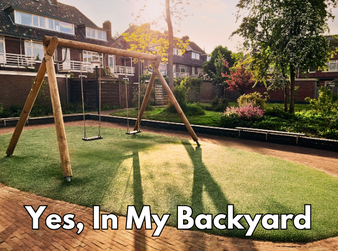 A primary objective of Joining Forces’ YIMBY (Yes, in My Backyard) Committee is to educate communities about the benefits of affordable housing and debunk misinformation that can serve as barriers to new affordability. Meeting this objective is important, because community opinions can make or break new affordable housing efforts. Joining Forces has been listening to and analyzing typical objections to affordable housing for years. Now, the YIMBY Committee is analyzing the most common concerns and finding that most objections fall into predictable categories. This is useful to us as advocates, because it can help us to acknowledge and respond to neighbors’ different concerns in different and constructive ways. Concerns about Problems That Have Solutions Neighbors of new developments of any kind often have good questions about the physical impact of a new building. Potential negative impacts of a new development, that could affect quality of life for the neighborhood, could be things like:
Fortunately, municipalities have standards and processes in their Community Development Departments that focus specifically on preventing problems like these when any new building is being considered. Developers must submit pre-approval plans showing how their building design will address these concerns. Sometimes they must pay for studies on the impact of their building. And these plans and studies are available to the public, and the public has the opportunity to share their concerns. Key YIMBY Message: Concerns about new housing are valid. However, these types of potential problems have solutions that a good developer and oversight team will address. They are not good reasons for not building affordable housing. Let’s talk about some of the reasons why affordable housing should be built! All buildings have potential to cause these problems, affordable or not. However, as technology and building materials and processes evolve, the tools developers can use to prevent these problems are more and more effective. A good Community Development Department will find ways to improve the physical integrity of the immediate neighborhood through development of new buildings, and public input can help them to ensure that they are addressing community concerns. Concerns about Common Misconceptions and Misinformation Opponents of affordable housing developments often have concerns about the impact on the neighborhood caused both by the housing and by the people who will live in the housing. Many of these concerns are based on assumptions about affordable housing that have become entrenched in our communities, even though research shows they are not true. These include the following, among others concerns:
Key YIMBY Message: Some people have preconceptions about what the people who need affordable housing are like, often based on images and stereotypes around people living in poverty and people living in old fashioned public housing. Research shows that affordable housing typically attracts people who already live in the neighborhood and that, at worst, it has no impact and, at best, it has a very positive impact. We have examples of such research that you can look into further. In the meantime, let’s talk about the benefits of affordable housing! While we don’t want to focus our YIMBY advocacy on these types of problems, we think it’s important to have information available to show the truth on these issues. A key activity of the YIMBY Committee right now is to build a review of research on these topics that provides rigorous evaluation of whether these fears and concerns typically hold true. Objections to Change and to Neighbors Who Are Different Some people who oppose new affordable housing in their neighborhoods are opposed to change in general, and others have overt prejudices against the people who they assume will need affordable housing. We need to take these on a case-by-case basis and, in most cases, will not spend a lot of time trying to change people’s minds. However, when objectors to affordability use coded terms such as “community character” and “those people,” we will consider engaging in conversation to clarify what the real issues are. We can also, delicately, address the greater good of affordable housing in communities. Some strategies we are looking at to guide advocates who may encounter people with strong biases include the following:
Key YIMBY Message: Even though you see problems with affordable housing, I hope you can see that there is a need for it and that by helping the people who need affordable housing, we can help the community as a whole. Ultimately, we are all looking for safe, comfortable, and welcoming neighborhoods. If you’d like to explore the issue further, please let me know. Next Steps The YIMBY Committee is actively researching resources that analyze all of these types of concerns about affordability and will be doing the following to expand our community education efforts:
To get involved with the YIMBY Committee, fill out our Membership Form or contact Nathaniel at [email protected].
0 Comments
Leave a Reply. |
|
© COPYRIGHT 2018. ALL RIGHTS RESERVED.
|




